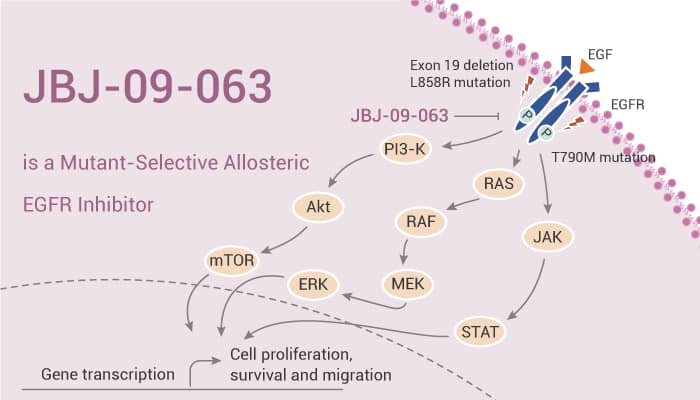JBJ-09-063 is a mutant-selective allosteric EGFR inhibitor. And the IC50 values are 0.147 nM, 0.063 nM, 0.083 nM, and 0.396 nM for EGFRL858R, EGFRL858R/T790M, EGFRL858R/T790M/C797S, and EGFRLT/L747S, respectively.
JBJ-09-063 is remarkably effective at inhibiting cell growth. And it also leads to a significant increase in apoptosis. JBJ-09-063 is effective in H1975 cells exogenously expressing the Osimertinib-resistant mutations.

JBJ-09-063 exhibits IC50s of 50 nM in Ba/F3 cells alone. While the IC50 values are 6 nM when it combinates with Cetuximab.
JBJ-09-063 (3 mg/kg i.v., 20 mg/kg p.o.) exhibits favorable pharmacokinetics properties and is sufficiently stable to deliver good efficacy upon oral dosing. As a result, This compound exhibits higher IV clearance (5.0 ml/min/kg vs. 15.7 ml/min/kg). And it also shows increased bioavailability (14.6%).
In a pharmacodynamic study, JBJ-09-063 effectively inhibits EGFR, Akt, and ERK 1/2 phosphorylation. In H1975 and the patient-derived DFCI52 xenograft models, both are EGFRL858R/T790M mutation tumor models. JBJ-09-063 shows a dose-dependent decrease in tumor volume over time. What’s more, 50 mg/kg and 100 mg/kg doses of JBJ 09-063 are as effective as Osimertinib in the H1975 model. Additionally, in In the DFCI52 model, JBJ-09-063 is similarly effective as Osimertinib at 50 mg/kg. And the tumor outgrowth is rapidly decreased after JBJ-09-063 treatment than Osimertinib. However, JBJ-09-063 has no effect on A431 tumor volume during the course of the study.
In conclusion, JBJ-09-063 is a potent EGFR inhibitor. It effectively reduces EGFR, Akt, and ERK1/2 phosphorylation. And it is effective across EGFR tyrosine kinase inhibitor (TKI)-sensitive and resistant models. JBJ-09-063 can be used for researching EGFR-mutant lung cancer.
Reference:
Nat Cancer. 2022 Apr;3(4):402-417